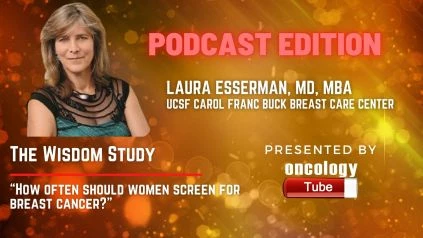Laura Esserman, MD, MBA, Professor of Surgery and Radiology is a surgeon and breast cancer oncology specialist practicing at the UCSF Carol Franc Buck Breast Care Center where she has also held the position of Director since 1996. She co-leads the Breast Oncology Program, the largest of the UCSF Helen Diller Comprehensive Cancer Center’s multidisciplinary programs speaks about The Wisdom Study – “How often should women screen for breast cancer?â€.
Link to Article:
https://www.thewisdomstudy.org/
As it approaches the 30,000 woman mark, nationwide research investigating a customized approach to breast cancer screening and risk assessment has begun a fresh push to diversify its participants.
WISDOM (Women Informed to Screen Depending on Measures of Risk), a multiyear study led by UC San Francisco and the Athena Breast Health Network, will use a new $9 million grant from the National Cancer Institute to increase ethnic diversity as it works toward its overall goal of enrolling 100,000 or more women.
The study is being carried out across the country in collaboration with five University of California medical institutions, Sanford Health, and other partners.
The study compares two approaches to breast cancer detection: standard annual mammography versus a personalized approach that considers multiple risk factors, such as genetic markers and breast density, to make a recommendation about when to start, stop, and how often to screen for breast cancer, as well as what type of irradiation to use.
According to Breastcancer.org, despite ongoing advancements in cancer care, over 42,000 women die each year from breast cancer, and one in every eight U.S. women is likely to acquire invasive breast cancer throughout her lifetime. Breast cancer kills more women in the United States than any other cancer except lung cancer.
Risk assessment is especially essential for women of color, who are more likely to get malignancies that are fatal. Despite having a slightly reduced chance of developing breast cancer, women of color are 40 percent more likely than white women to die from it once diagnosed. WISDOM has appointed Kim Rhoads, MD, MS, MPH, associate director for community engagement at the UCSF Helen Diller Family Comprehensive Cancer Center, to lead the national effort to recruit women from a variety of backgrounds, ethnicities, and geographic locations in order to better identify those at highest risk in these communities.
Louisiana State University, University of Chicago, and Ingalls Memorial Hospital in Illinois, University of Alabama, and Topline MD Alliance in Florida are among the medical facilities involved in the endeavor.
When yearly breast cancer screening became the gold standard in the United States in the mid-1980s, it was thought that all women were at risk for the same disease. It was hoped that by detecting all tumors early, the chance of more aggressive cancers would be reduced. Despite extensive screening, however, women continue to acquire aggressive malignancies, while many more benign tumors are discovered that would otherwise go undetected.
According to Esserman, screening standards must evolve to match advances in medicine. Basic ideas, such as when to start screening, how often to screen, and what imaging to employ, are still being disputed. Some standards suggest starting screening at the age of 40, while others suggest starting at 45 or even 50.
The research’s design is unique in that participants can be allocated to the yearly screening arm or the customized risk assessment arm at random, or they can pick which arm of the study they want to participate in. The customized arm comprises a risk assessment based on family history, exposures, breast density, co-morbidity, and genetic predisposition that is adapted to different ethnicities. It yields an overall score that helps clinicians to choose when to begin screening, when to stop, how often to screen, and what sort of screening to perform, all while staying within one of the guidelines’ recommendations.
The Patient-Centered Outcomes Research Institute, the National Cancer Institute, the University of California, and other fundamental initiatives have all contributed to WISDOM.

